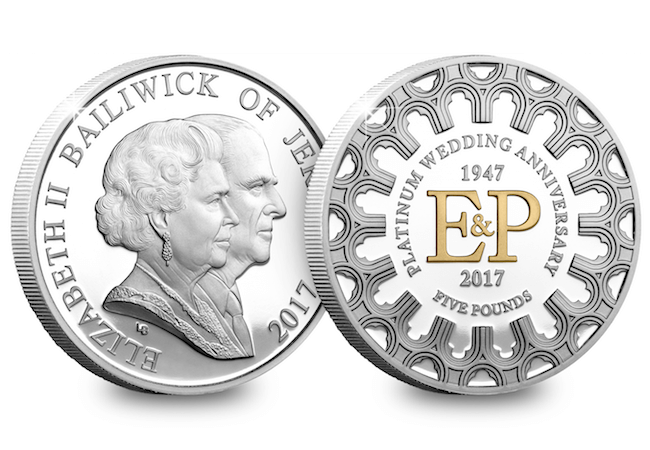Information
New UK coin released celebrating the Four Generations of Royalty for first time ever
The Royal Mint has today announced the release of a coin that everyone has been anticipating since the moment HRH Prince George of Cambridge was born on 22nd July 2013 – a coin celebrating the four generations of royalty.
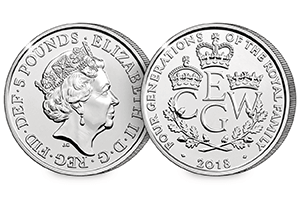
2018 UK Four Generations of Royalty £5 coin
This is the first time that all four generations of royalty have been celebrated on a UK coin. The last time four generations of royalty were celebrated together was in 1894 under the reign of Queen Victoria.
2018 is an incredibly special year for the Royal family as they celebrate a variety of important milestones including the Queen’s 65th anniversary of her Coronation, the Prince of Wales’ 70th birthday and Prince George’s 5th birthday so it’s perfect timing for such a special coin issue!
Here’s everything you need to know about this important new release:
The stunning reverse features an original design by much-loved heraldic artist Timothy Noad, and ornately shows the initials of the current four generations, E, C, W, G, and represents the heritage of the House of Windsor.
The coin is available in several different finishes, all with varying edition limits that are likely to sell out quickly. Here’s your guide to the new 2018 Four Generations of Royalty coin range:
Perfect Quality. Very Affordable.
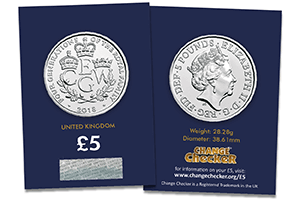
UK 2018 Four Generations of Royalty CERTIFIED BU £5 coin
The Royal Mint is releasing a brilliant uncirculated base metal version of the Four Generations of Royalty £5 coin. These coins have been specially struck and carefully handled to ensure that they are free of scratches and chips found amongst circulating coins.
Known as Brilliant Uncirculated (BU), they are available for £13.00 in a Royal Mint Presentation Pack or £10.99 in a Change Checker Certified Brilliant Uncirculated Collector Card.
Silver Proof – the Collector’s Favourite.
The Silver Proof £5 coin is firmly established as the most sought-after coin amongst collectors because they have all the qualities that collectors really desire.
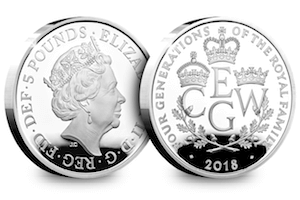
UK 2018 Four Generations of Royalty Silver Proof £5 coin
- Precious metal content– struck from 925/1000 Sterling Silver.
- Strictly Limited Edition– just 5,000 coins. That’s 3,000 less than the Sapphire Jubilee £5 Silver Proof coin. That had a mintage of 8,000 and completely sold out at The Royal Mint.
- The perfect Proof Finish– even better than Brilliant Uncirculated. Proof coins are struck several times using specially polished dies to create a flawless finish with a perfect mirrored background. The ultimate coin quality.
Double the thickness. More than twice as limited.
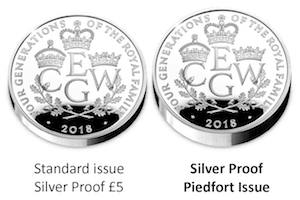
UK 2018 Four Generations of Royalty Silver Proof Piedfort £5 coin
For silver collectors looking for something even more collectable, the double thickness Piedfort edition is the pinnacle of Royal Mint craftsmanship, they are twice the thickness and weight of a standard coin. They also have much lower edition limits than their standard silver counterparts.
There are just 2,000 Four Generations of Royalty £5 silver proof Piedfort’s – less than half the maximum mintage for the standard £5 silver proof.
The Gold Standard
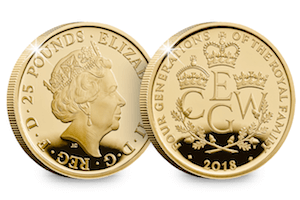
UK 2018 Four Generations of Royalty 1/4 oz Gold Proof coin
For the ultimate limited edition, you can own the Four Generations of Royalty in Gold proof. This has been issued in two specifications: the Gold Proof ¼ oz coin and the £5 Gold Proof coin.
The ¼ oz is struck from 24 Carat Gold and just 1,100 have been authorised for release.
The £5 is struck from 39.94g of 22 Carat Gold to a flawless proof finish. Only 500 will be issued – 250 LESS than the equivalent Sapphire Jubilee Gold £5 that completely sold out at the Mint in ONE WEEK.
Due to its very limited nature, we will contact you directly to discuss owning the Gold Proof £5 Coin if you are interested – please complete the form below:
Your message has been sent
If you’re interested …
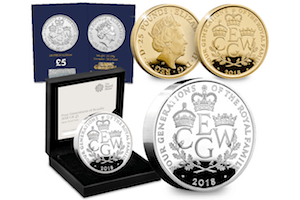 You can own one of the special collector edition Four Generations of Royalty £5 coins today, click here to view the full range >>
You can own one of the special collector edition Four Generations of Royalty £5 coins today, click here to view the full range >>
New 50p coins to enter circulation for Platinum Wedding Anniversary
In just a few weeks’ time something remarkable happens. Her Majesty the Queen and HRH Prince Philip celebrate 70 years of marriage – their Platinum Wedding Anniversary
You probably know someone who has celebrated their Golden Wedding Anniversary (50 years of marriage). You may even know someone who has reached 60 years – their Diamond Wedding Anniversary. But I’d be happy to place a small wager that you don’t know anyone who has managed 70 years of marriage.
That’s because only around 30 couples in the whole of the UK ever reach that milestone each year. Or to put it another way – the Queen and Prince Philip are literally one in a million.
And to mark the occasion, eight special commemorative 50p coins have been issued. It is the VERY FIRST time that British Isles specification 50p coins have been struck to mark a key royal wedding anniversary such as this.
Most importantly, these coins have been authorised by the Isle of Man Treasury, have full legal status AND a very limited number will enter circulation in the Isle of Man.
The UK’s most collectable coins…
The 50p coin has rapidly become the UK’s most collectable coin spurred on by the release of the Olympic 50p coins and, more recently, the incredible demand for the UK’s Beatrix Potter coins.
And that’s why these issues are so important.
British Isles 50p coins like this rarely turn up in your change in the UK, making them some of the most sought-after circulating coins around.
As the first major Royal wedding anniversary to feature on any British Isles standard specification 50p coins, this is a very significant moment.
A moment that’s made even more important due to the incredible milestone 70 years of marriage represents.
How you can own the new coins…
Start collecting the new Platinum Wedding 50p coins, struck to superior Brilliant Uncirculated Collector Quality for your special introductory price of just £3.99.
New one-year only double portrait released to celebrate The Queen and Prince Philip’s 70 years of marriage
On the 20th November, Her Majesty Queen Elizabeth II and HRH the Duke of Edinburgh will celebrate their Platinum Wedding Anniversary – that’s an incredible 70 years of marriage and a first in British royal history.
In honour of the occasion a new coin has been issued – featuring a specially commissioned one-year-only double portrait.
The coin has been officially approved by both Her Majesty the Queen and Prince Philip, and proudly displays their initials surrounded by a design inspired by the North Rose Window of Westminster Abbey – where their wedding took place in 1947.
But it is the new double portrait that will turn heads and have collectors rushing to secure theirs. Designed by renowned sculptor Luigi Badia, it features both The Queen and The Duke of Edinburgh and will only ever be seen on Platinum Wedding Anniversary Coins.
It’s not very often that one-year-only portraits are released, not to mention a double portrait. They really are only issued for the most important Royal anniversaries.
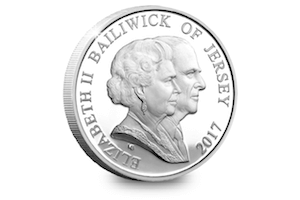
New one-year-only obverse design
As you’ll appreciate, designing a new effigy is not a simple process, with an extremely rigorous approval procedure.
That’s why special portraits such as this are few and far between and are so popular with collectors.
Luigi, from New York, explains the concept behind the design:
“I was extremely honored to be commissioned to sculpt a brand new portrait to celebrate Her Majesty The Queen’s and HRH The Duke of Edinburgh’s 70th wedding anniversary. I was inspired to use a contemporary image of the royal couple to capture both their achievement of reaching such a milestone and to reflect on the long life they have shared together.”
The design process…
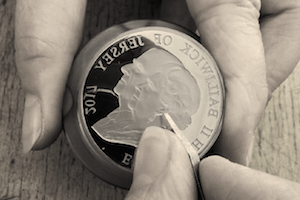
The design is intricately engraved onto the die
Careful consideration has to be put into the shape and size of the coin. Luigi painstakingly hand-engraved the design – with the added complication of retaining the typesetting within the circular shape.
The finalised ‘plaster’ engraving is then ready to be reduced down into a die (shown opposite) – which is hardened and used to mint the commemorative coins collectors can own.
Struck to a variety of specifications…
The new coin is to be struck in a range of different specifications, from a face value version right up to a staggering 10oz platinum edition – which has already sold out.
And the other coins are likely to prove just as popular – with a highly collectable proof coin, a pure silver coin, and a 5oz gold coin amongst those available, there is something to suit everyone.
These coins really do make a fitting tribute to Her Majesty and Prince Philip’s 70 years of marriage, and the stunning double portrait marks them out as truly prestigious commemoratives to forever remember this once-in-a-lifetime celebration.
If you are interested…
You can mark the occasion by adding the Platinum Wedding Anniversary Proof £5 Coin to your collection today. It’s limited to just 4,950 worldwide and a sell-out is expected, especially as it features the new one-year-only double portrait.




